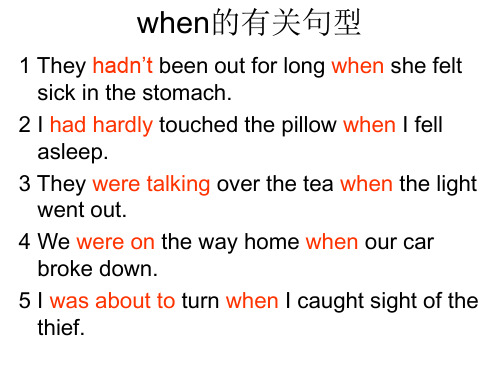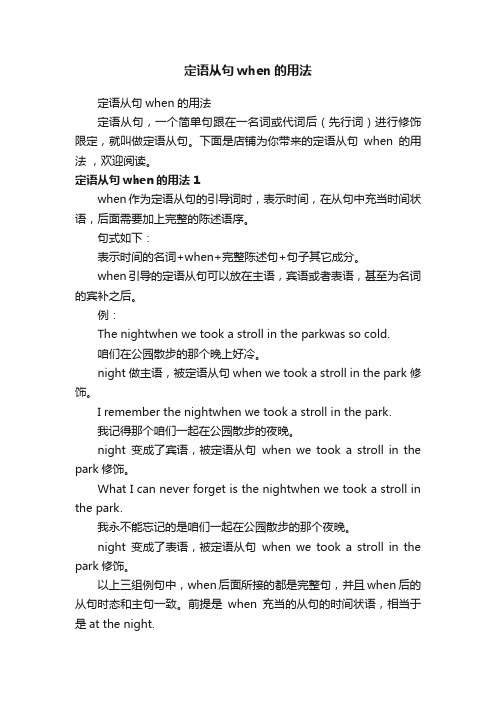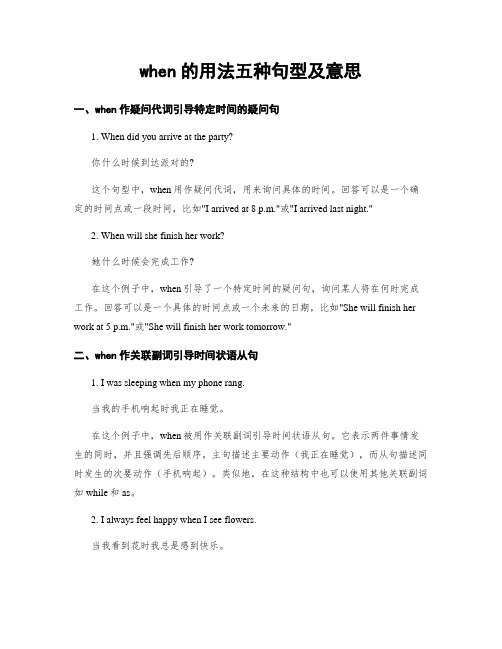专项调研-When句型
when的有关句型

既可以及物也可以不及物的动词短语 get across Did your speech get across to the crowd? pull through
你的演说听众理解吗? What message are you trying to get across to the consumer? The support of my fans has pulled me through. Your dad is going to pull through.
when的有关句型
6 They were going to finish their project when. something usual happened. Wrap-up: 1 The operation was on﹏﹏﹏﹏ the lights went out. 2 Hardly had she entered the room ﹏﹏﹏﹏ she saw Amy sitting on the bed smiling at her. 3 They hadn’t gone long ﹏﹏﹏﹏ the accident happened.
when的有关句型
1 They hadn’t been out for long when she felt sick in the stomach. 2 I had hardly touched the pillow when I fell asleep. 3 They were talking over the tea when the light went out. 4 We were on the way home when our car broke down. 5 I was about to turn when I caught sig们正在观看比赛,这时灯熄灭了。 • We were watching the game when the lights were put out. • 他们正要离开的时候天开始下雨了。 • They were about to leave when it began to rain. • They were going to leave when… • When they were going to leave, it began to rain.
when的用法四种句型疑问句

when的用法四种句型疑问句一、 when的用法简介当我们谈论时间时,"when" 是一个常用的词汇。
它主要用来询问或描述特定事件或行动发生的时间。
在英语中,"when" 可以用于四种不同的句型疑问句,即基本疑问句、选择疑问句、特殊疑问句和反义疑问句。
以下将详细探讨这四种句型并给出相应的例句。
二、基本疑问句基本疑问句是最简单直接的方式来询问时间。
它由主语与动词调换位置而成,并以一个问号结尾。
1. When did you arrive at the party?(你什么时候到达聚会现场?)2. When will they start the meeting?(他们什么时候开始会议?)3. When does the train leave?(火车什么时候离开?)这些例子清晰地表明了"when" 在构建基本疑问句中的角色,并且可以通过替换不同的动词和主语创建很多类似类型的问题。
三、选择疑问句选择疑问句通常提供两个或更多选项,并要求对方从中选择一个正确答案。
"when" 在选择疑问句中使得问题更加具体,关于具体行动发生的时间。
1. When is the best time to call you, morning or evening?(早上或晚上打电话给你最好的时间是什么时候?)2. When do you prefer to have lunch, at twelve o'clock or one o'clock?(你更愿意在12点还是1点吃午饭?)3. When would you like to schedule the appointment, this week or next week?(你希望什么时候安排见面,这周还是下周?)通过使用选择疑问句,我们可以在提供选项的基础上更进一步了解对方的偏好和时间计划。
定语从句when的用法

定语从句when的用法定语从句when的用法定语从句,一个简单句跟在一名词或代词后(先行词)进行修饰限定,就叫做定语从句。
下面是店铺为你带来的定语从句when的用法,欢迎阅读。
定语从句when的用法1when作为定语从句的引导词时,表示时间,在从句中充当时间状语,后面需要加上完整的陈述语序。
句式如下:表示时间的名词+when+完整陈述句+句子其它成分。
when引导的定语从句可以放在主语,宾语或者表语,甚至为名词的宾补之后。
例:The nightwhen we took a stroll in the parkwas so cold.咱们在公园散步的那个晚上好冷。
night 做主语,被定语从句when we took a stroll in the park 修饰。
I remember the nightwhen we took a stroll in the park.我记得那个咱们一起在公园散步的夜晚。
night变成了宾语,被定语从句when we took a stroll in the park修饰。
What I can never forget is the nightwhen we took a stroll in the park.我永不能忘记的是咱们一起在公园散步的那个夜晚。
night变成了表语,被定语从句when we took a stroll in the park修饰。
以上三组例句中,when后面所接的都是完整句,并且when 后的从句时态和主句一致。
前提是when充当的从句的时间状语,相当于是at the night.所以,以上三句,可以把when都改成at which。
写作必备when引导定语从句句式:There was a time when...... 曾经。
There was a time when people were never bothered by pollution.曾经人们不用为污染烦忧。
WHEN 的几个句型

When的句型一、when引导状语的八个重要句型1. be doing sth…when…正在做...,这时...The reporter said that the UFO_______ (travel) east to west when he saw it.(NMET2000)I _________(drive) down to London when I suddenly found that I was on the wrong road.(2017天津)2.be (just)about to do sth…when…正要....这时He was about to tell me the secret _______ someone patted him on the shoulder.(上海)3.be on the point of doing ...when... 正当....这时She was on the point of going out when the telephone rang.4.had just done…when…刚....就...I had just gone to bed after a very hard day when my father opened the door and came in.5.had hardly/scarcely/rarely done...when.... “一...就...”He had hardly seen me when he ran away. → Hardly had he seen me when he ran away.6.be+介词短语+when... 就在这时They were at work in the office when a big fire broke out.7. When it comes to..., ... 当谈到...When it comes to raising children, different people have different opinions.8.When doing/done, ... 当...时when _______(arrive) at the cinema, we found the movie had been over.When_______(ask) what had happened, he lowered his head.二、when引导定语从句的四个句型1.It was a time when...那是一个...的时期It was a time when women had no right to be educated.2.There was a time when...曾经有段时间...There was a time when I was addicted to online games and had no interest in study.3.There comes a time when... ...时代的到来There comes a time when the old give way to the new.4.The moment came when.... ...时刻的到来The moment came when the Berlin Wall came down .。
when的用法五种句型及意思

when的用法五种句型及意思一、when作疑问代词引导特定时间的疑问句1. When did you arrive at the party?你什么时候到达派对的?这个句型中,when用作疑问代词,用来询问具体的时间。
回答可以是一个确定的时间点或一段时间,比如"I arrived at 8 p.m."或"I arrived last night."2. When will she finish her work?她什么时候会完成工作?在这个例子中,when引导了一个特定时间的疑问句,询问某人将在何时完成工作。
回答可以是一个具体的时间点或一个未来的日期,比如"She will finish her work at 5 p.m."或"She will finish her work tomorrow."二、when作关联副词引导时间状语从句1. I was sleeping when my phone rang.当我的手机响起时我正在睡觉。
在这个例子中,when被用作关联副词引导时间状语从句。
它表示两件事情发生的同时,并且强调先后顺序。
主句描述主要动作(我正在睡觉),而从句描述同时发生的次要动作(手机响起)。
类似地,在这种结构中也可以使用其他关联副词如while和as。
2. I always feel happy when I see flowers.当我看到花时我总是感到快乐。
这个例子展示了when引导时间状语从句,描述在特定情况下发生的一般动作。
主句表达一个经常性的感觉,而从句则指明特定触发条件(看到花)。
在这种结构中,也可以使用其他关联副词如whenever和every time。
三、when作连词引导条件状语从句1. You will succeed when you work hard.当你努力工作时你会成功。
when的三个基本句型

when的三个基本句型当我们聊到“when”这个词的时候,大家大概都会想,它是不是就是“当……的时候”的意思?确实没错!但"when"的用法可不仅仅是这么简单的,它还大有学问呢。
今天我们就来聊聊这个小词的三个基本句型,帮你轻松掌握它,避免以后再犯错。
反正,学了这些,你的英语水平绝对不止是一般的“when”了!首先呢,我们来说第一个常见的句型——when + 主语 + 动词。
这个结构听起来是不是很简单?没错,就是最直白的“当……的时候”意思了。
例如,“When I was a kid, I loved playing outside”(当我还是个孩子的时候,我喜欢在外面玩)。
说实话,这个句型用得最广泛,几乎每个人都会在日常生活中用到。
你想表达某个特定时刻发生的事情,直接套用这个句型就对了!比如,“When she came home, the whole family was waiting for her”(当她回家的时候,全家人都在等她)。
怎么样,简单吧?有时候它还可以表达习惯性动作,比如,“When I go to the gym, I always listen to music”(当我去健身房的时候,我总是听音乐)。
是不是特别轻松地就能传达你要表达的意思?然后呢,第二个句型也蛮常见的,特别是你想表示某个动作是“在某个时刻发生的”。
这时候,我们可以用when + 主语 + 动词(一般现在时)来描述一种普遍的真理或习惯。
例如,“When it rains, the streets get really slippery”(当下雨的时候,街道会变得非常滑)。
这个句型啊,特别适合用来描述天气、自然现象或者是一些规律性的事情。
比如,“When the sun sets, the sky turns orange”(当太阳落下时,天空变成橙色)。
这就像是在讲一个公理一样,无论谁都能明白。
when句型的用法总结

when句型的用法总结一、when 句型的基本用法1. 定义和介绍When 是一个连词,引导时间状语从句。
它表示某个动作或状态发生的具体时间。
2. 当句子表示“当…时”,“每当…”等含义时,我们可以使用 when 来引导时间状语从句。
例如:- When I was young, I used to play soccer every day.(我小时候,每天都踢足球。
)- When it rains, I like to stay at home and read books.(下雨的时候,我喜欢呆在家里读书。
)3. 当主句和时间状语从句表示将来的情况时,我们通常使用一般现在时代替将来时。
例如:- We'll go swimming when she arrives tomorrow.(她明天到达后,我们会去游泳。
)- He will take a vacation when he finishes his project next month.(他下个月完成项目后会休假。
)4. time words 或者频率词类正是应用 when 句型中的好帮手。
这些time words包括:before(在...之前)、after(之后)、as soon as(一...就)、until/till(直到、至到)和while等。
这些频率词类还包括:always(总是), usually(通常), often(经常), sometimes(有时候), rarely(很少), never(从未)等。
5. 引导时间状语从句的其它连词在 when 句型中,还有其他可以引导时间状语从句的连词,如 while(当...期间)、as(正当...时候)和 before(在...之前)。
这些连词也可以根据具体的语境来选择使用。
二、when 句型的高级应用1. 定义和介绍When 句型除了上述基本用法之外,还拥有更多复杂的表达方式,使得句子更具丰富性、准确性。
when的五个句型

when的五个句型when是一个常用的连词,它可以引导时间状语从句,表示“当……时候”。
在英语中,when的用法有五种基本的句型,分别是:S + V + when + S + VS + be V-ing + when + S + VS + be about to V + when + S + VS + had (not) V-ed + when + S + VS + had just V-ed + when + S + V下面我们来看看这五种句型的具体用法和例句。
一、S + V + when + S + V这种句型表示主句和从句的动作是同时发生或先后发生的。
从句中的动词可以是延续性的或非延续性的。
例如:He arrived when I was leaving. 他到达的时候我正要离开。
(先后发生,从句中的动词是延续性的)She called me when she got home. 她到家的时候给我打电话。
(先后发生,从句中的动词是非延续性的)We often play chess when we have free time. 我们有空的时候经常下棋。
(同时发生,从句中的动词是延续性的)He always smiles when he sees me. 他每次见到我都会笑。
(同时发生,从句中的动词是非延续性的)二、S + be V-ing + when + S + V这种句型表示主句的动作发生在从句的动作过程中,主句中的动词必须是延续性的,从句中的动词可以是延续性的或非延续性的。
例如:He was reading a book when I came in. 我进来的时候他正在看书。
(主句和从句都是延续性动词)She was sleeping when the phone rang. 电话响的时候她正在睡觉。
(主句是延续性动词,从句是非延续性动词)They were talking when the teacher entered the classroom. 老师进教室的时候他们正在说话。
- 1、下载文档前请自行甄别文档内容的完整性,平台不提供额外的编辑、内容补充、找答案等附加服务。
- 2、"仅部分预览"的文档,不可在线预览部分如存在完整性等问题,可反馈申请退款(可完整预览的文档不适用该条件!)。
- 3、如文档侵犯您的权益,请联系客服反馈,我们会尽快为您处理(人工客服工作时间:9:00-18:30)。
(八)高考专项调研When句型
A.最新高考真题
1.(全国)When does the bank close on Saturday?
A.At 1:00 pm.
B.At 3:00 pm.
C.At 4:00 pm.
2.(重庆)When did the two speakers plan to meet Jane?
A.At 2:00 .
B.At 2:15.
C.At 2:30.
B.历年高考试题经典
1.(湖南)When will they get there for the play?
A.9:00.
B.10:00.
C.10:30
2.(湖南)When will the magazine probably arrive?
A.Wednesday.
B.Thursday. C.Friday.
3.(湖南)When will the two speakers leave if they get cheaper tickets?
A.On Tuesday.
B.On Thursday.
C.On Friday.
4.(全国)When can the woman get the computers?
A.On Tuesday.
B.On Wedsday.
C.On Thursday.
5.(湖南)When will the man probably get to London?
A.At 8 o'clock.
B.At 9 0'clock.
C.At 10 o'clock.
C.命题特点分析
以when提问的问题,一般要求学生根据对话中提到的多个时间进行计算或推算从而得出问题中要求学生指出的时间。
一般这样的题目多不会直接给出题目所要求的时间,都会要求学生根据听到的内容做简单的计算。
D.一线专家命题
1.When are they going to the concert tomorrow?
A.At 6:30 am.
B.At 6:10 pm.
C.At 6:00 pm.
2.When is the live broadcast?
A.At 6:30.
B.At 7:30.
C.At 8:30.
3.When is it now?
A.In the evening.
B.At noon.
C.In the morning.
4.When will the woman take a taxi?
A.11:15 am.
B.11:00 am.
C.11:30 am.
5.When did the man have breakfast?
A.At 7:15.
B.At 7:30.
C.At 8:00 am.
6.When did the lecture probably start?
A.At 10:00 am.
B.At 9:oo am.
C.At 8:30.
7.When does the supermarket open?
A.At 8:40.
B.At 9:00 am.
C.At 10:oo am.
8.When is Jenny supposed to be here?
A.At 10:30 am.
B.At 11:00 am.
C.At 11:30 am.
9.When do the speakers plan to meet?
A.This afternoon.
B.Tomorrow morning.
C.Tomorrow afternoon.
10.When is it now?
A.8:30 am.
B.9:00 am.
C.9:30 am.
11.When is the man's flight?
A.9:oo am.
B.9:50 am.
C.9:30 am.
12.When is the last train?
A.9:48 pm.
B.10:18 pm.
C.10:50 pm.
13.When is John supposed to arrive?
A.At 7:30 am.
B.At 8:00 am.
C.At 8:15 am.
14.When did the woman call the front desk?
A.At 8:oo am.
B.At 2:00 am.
C.At 2:30 pm.
15.When should the woman hand in the project?
A.Today.
B.Yesterday.
C.The day before yesterday.
16.When is it now?
A. 3:oo pm.
B.3:30 pm.
C.6:30 pm.
17.When should the man make the call?
A.8:00 am.
B.10:00 am.
C.12:00 am.
18.When will the mother arrive?
A.At noon.
B.At 3:30 pm.
C.At dinnertime.
19.When will the speakers meet?
A.On Saturday.
B.On Sunday.
C.On Monday.
20.When will be woman get home?
A.At 5:15 pm.
B.At 5:30 pm.
C.At 5:45 pm.。
